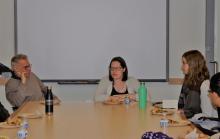By Medha Raman | LSJ Communications Assistant
As the Trump administration has attempted to implement its controversial agenda, Washington state Attorney General Bob Ferguson’s office has been crucial in challenging them every step of the way.
LSJ Alum Colleen Melody (Class of 2004), head of the Attorney General’s Wing Luke Civil Rights Unit, has been one of the key players in this movement. She recently returned to campus to share her experiences with LSJ majors.
“I don’t think I anticipated litigating against the federal government,” Melody said. “People always ask me whether I’m proud of the work that I do, and honestly, I’m very disappointed that these cases are necessary.”
Melody began her story by talking about her days as an undergrad, when she was looking to declare a major. Initially unsure about pursuing law, she decided on LSJ after taking a few courses and realizing that it aligned well with her interests.
“I’ve always been interested in the ‘why,’” Melody said. “Why structures and institutions are the way they are and why that affects people in the way that it does.”
After finding a new home in LSJ, Melody moved on to UW Law School, where she was a Gates Public Service Scholar. Upon graduation, she clerked for a judge on the 9th Circuit of the U.S. Court of Appeals and eventually moved to Washington DC to work on housing discrimination cases at the Civil Rights Division of the US Department of Justice.
“Housing discrimination is really my background and my favorite issue to work on,” Melody said. “I think all opportunities are keyed off of where you live—what kind of school you go to, whether you have public transportation, whether you have clean drinking water, what your access to employment or law enforcement looks like. It’s the issue that I’m really drawn to the most.”
When Attorney General Bob Ferguson created the new Wing Luke Civil Rights Unit in January 2015 to investigate and enforce anti-discrimination law, Melody returned to Seattle to manage the new department. Since then, the department has significantly grown and has taken on many cases, both in the state of Washington and federally.
Currently, the unit is involved in sexual assault lawsuits in Eastern Washington and a lawsuit against practices at the Northwest Detention Center. On a federal level, they are litigating several high-profile cases challenging many of President Trump’s recent decisions, including the travel ban, the decision to terminate DACA, the transgender military ban, and more.
During her talk, Melody also delved into the process by which the Attorney General’s Office selects cases. The two main questions at the center of any issue are whether there is a clear violation of the law, and whether it affects people in Washington State.
“My goal is that the Attorney General’s Office should talk for people in Washington about Washington,” Melody said.
To understand what issues truly affect Washington and its residents, the Civil Rights Unit engages with a wide population, including community leaders, religious organizations, and public servants. For example, in litigating the travel ban case, the Unit creatively connected the displacement of refugees who had never been to Washington to the work of many Washington based refugee resettlement non-profits and religious groups.
Melody credits part of this creativity and critical thinking ability to her experience in LSJ.
“I think my LSJ education provided me with an interdisciplinary thinking about rights, a perspective that I don’t see in my non-LSJ colleagues,” Melody said. “Thinking about rights and responsibilities creatively and thoughtfully ends up mattering in even the most narrow, procedural cases. It makes our cases stronger.”
Melody concluded with advice to students, encouraging them to use what they had learned in LSJ to make a difference.
“To me, it’s about what you think is a meaningful way to end the day,” Melody said. “Right now, it’s really easy to feel down. But it’s important to think about how your piece matters and how you can make a difference.”
